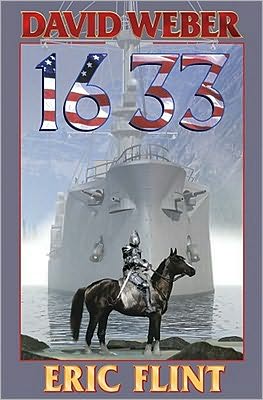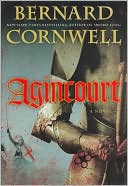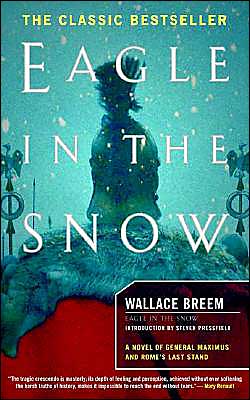1633 (1632 Series #2)
AMERICAN FREEDOM AND JUSTICE VS. SEVENTEENTH CENTURY TYRANNY\ The new Confederate Principalities of Europe-an alliance between Gustavus, King of Sweden, and the West Virginia town, led by Mike Stearns, which was hurled back through time to the Thirty Years War-has big problems. As the greatest naval war in European history erupts, Cardinal Richelieu has created an alliance to destroy the CPE, and only American technology can save Gustavus from ruin.\ Meanwhile Mike's wife Rebecca is trapped...
Search in google:
AMERICAN FREEDOM AND JUSTICE VS. SEVENTEENTH CENTURY TYRANNY The new Confederate Principalities of Europe-an alliance between Gustavus, King of Sweden, and the West Virginia town, led by Mike Stearns, which was hurled back through time to the Thirty Years War-has big problems. As the greatest naval war in European history erupts, Cardinal Richelieu has created an alliance to destroy the CPE, and only American technology can save Gustavus from ruin. Meanwhile Mike's wife Rebecca is trapped in war-torn Amsterdam, and his sister Rita is imprisoned in the Tower of London. And much as Mike wants to reform tyrannical 17th century Europe by Sweet Reason, he finds comfort in the fact that Julie, who trained as an Olympic marksman, still has her riflePublishers WeeklyIn this worthy sequel to the well-received 1632 (2000), about a small West Virginia coal-mining town transported back in time to the Germany of the Thirty Years War, original author Flint and coauthor Weber resist the temptation to use modern technology to impose a Pax Americana, instead allowing their transportees just enough high tech to prevail if they can win allies like Sweden's King Gustavus Adolphus. Most of the current book deals with coalition building, as the visitors from the future attempt to remake their new world into one safe for democracy despite opposition from such as Cardinal Richelieu. History books from a now-hypothetical future and antibiotics prove to be more potent than their limited supply of modern firearms, but the most powerful weapons of the new "United States" are its ideas, which now infect the millions of Germans ground under the heels of their princes. Ordinary Germans develop a new faith in themselves and their future when the Americans show them that they can do anything, even fly. Flint, a former union organizer, is particularly skilled at showing how the new converts can make even the "old Americans" uncomfortable in their zeal to achieve the blessings of "life, liberty, and the pursuit of happiness," while Weber helps smooth out characters who were stereotypes in the first book. This is a thoughtful and exciting look at just how powerful are the ideals we sometimes take for granted, and is highly recommended as a reminder of how we can look to others when at our best. (Aug.) FYI: Weber is also the coauthor with Steve White of The Shiva Option (Forecasts, Jan. 28), while Flint is also the coauthor with David Drake of The Tyrant (Forecasts, Mar. 25). Copyright 2002 Cahners Business Information.
1633\ \ By David Weber Eric Flint \ Baen Books\ ISBN: 0-7434-3542-7 \ \ \ \ Chapter One\ "How utterly delightful!" exclaimed Richelieu. "I've never seen a cat with such delicate features. The coloration is marvelous, as well." \ For a moment, the aristocratic and intellectual face of France's effective ruler dissolved into something much more youthful. Richelieu ignored Rebecca Stearns entirely, for a few seconds, as his forefinger played with the little paws of the kitten in his lap. Rebecca had just presented it to Richelieu as a diplomatic gift.\ He raised his head, smiling. "A 'Siamese,' you call it? Surely you have not managed to establish trade relations with southeast Asia in such a short time? Even given your mechanical genius, that would seem almost another miracle."\ Rebecca pondered that smile, for a moment, while she marshaled her answer. One thing, if nothing else, had become quite clear to her in the few short minutes since she had been ushered in to a private audience with the cardinal. Whatever else he was, Richelieu was possibly the most intelligent man she had ever met in her life. Or, at least, the shrewdest.\ And quite charming, in person-that she had not expected. The combination of that keen intellect and the personal warmth and grace was disarming to someone like Rebecca, with her own basically intellectual temperament.\ She reminded herself, very firmly, that being disarmed in the presence of Richelieu was the one thing she could least afford. For all his brains and his charm, the cardinal was almost certainly the most dangerous enemy her nation faced at the moment. And while she did not think Richelieu was cruel by nature, he had demonstrated before that he was quite prepared to be utterly ruthless when advancing what he considered the interests of his own nation. La gloire de France was a phrase which rang splendidly-but, like a sword, had a sharp edge to those who stood in the way.\ She decided to pursue the double meaning implicit in the cardinal's last sentence.\ "'Another' miracle?" she asked, raising an eyebrow. "An interesting term, Your Eminence. As I recall, the most recent characterization you gave the Ring of Fire was 'witchcraft.'"\ Richelieu's gentle smile remained as steady as it had been since she entered his private audience chamber. "A misunderstanding," he insisted, wiggling his fingers dismissively. Then, paused for a moment to admire the kitten batting at the long digits. "My error, and I take full responsibility for it. Always a mistake, you know, to jump to conclusions based on scant evidence. And I fear I was perhaps too influenced at the time by the views of Father Joseph. You met him yesterday, I believe, during your audience with the king?"\ Another double meaning was buried in that sentence as well. Subtly, Richelieu was reminding Rebecca that her alternative to dealing with him was the rather childish King Louis XIII-or, even worse, the religious fanatic Father Joseph. The Capucin monk was close to Richelieu, and was also the leader of the harshly intolerant Catholic lay organization of France known as the Company of the Holy Sacrament.\ Rebecca controlled the natural impulse of an intellectual to talk. In this, as in so many things, her far less intellectual husband had trained her. Mike Stearns was a trade union leader in his origins. So, unlike Rebecca, he had learned long ago that the best tactic in negotiations is often simply to say nothing.\ "Let the other side do most of the talking," he'd told her. "On average, I'd say anyone's twice as likely to screw up with their mouth open than closed."\ The cardinal, of course, was quite familiar with the ploy himself. Silence lengthened in the room.\ For an intellectual, silence is the ultimate sin. So, again, Rebecca found herself forced to keep it zipped!\ She took refuge in memories of her husband. Mike, standing in the doorway to their house in Grantville, his face somewhat drawn and unhappy, as he bid her farewell on her diplomatic journey to France and Holland. The same face-she found this memory far more comforting-the night before, in their bed.\ Something in the smile which came to her face at that memory defeated the cardinal. Richelieu's smile never wavered, true. But he did take a deep breath and, gently but firmly, set the kitten down on the floor and left off his idle playing.\ "The 'Ring of Fire,' as you call it-which brought your 'Americans' and their bizarre technology into our world-was enough to confuse anyone, madame. But further reflection, especially with further evidence to base it upon, has led me to the conclusion that I was quite in error to label your ... ah, if you will forgive the term, bizarre new country the product of 'witchcraft.'"\ Richelieu paused for a moment, running his fingers down his rich robes. "Quite inexcusable on my part, really. Once I had time to ponder the matter, I realized that I had veered perilously close to Manicheanism." With a little chuckle: "And how long has it been since that heresy was condemned? A millennium and a half, ha! And here I claim to be a cardinal!"\ Rebecca decided it was safe enough to respond to the witticism with a little chuckle of her own. Nothing more than that, though. She could practically feel the cardinal's magnetic personality drawing her in, and didn't doubt for a moment that Richelieu understood the power of his own charm quite well. By all accounts, the cardinal was a chaste man. But 'seduction' was a term which had more than one application. Time after time, Richelieu's rise to power and influence had been eased by that personal grace and charm-and, with other intellectuals, the suppleness of his mind. Were she not, for all practical purposes, the envoy of a nation at war with Richelieu, she would have enjoyed immensely spending a few hours with one of Christendom's most prodigious intellects discussing the theological implications of the strange event which had brought an entire town of people into 17th-century Europe from a place centuries in the future called "the United States of America."\ Silence, woman! Obey your husband!\ And that thought, too, reinforced her own serene smile. In truth, Mike Stearns was very far removed from a "patriarch." He would be amused, Rebecca knew, when she told him of her self-admonition. ("I will be good God-damned. You mean that for once you listened to me?")\ It was another little defeat for Richelieu. Something in the set of his smile-a trace of stiffness-told her so. Again, the cardinal ran fingers down his robe, and resumed speaking.\ "No, only God could have caused such an incredible transposition of Time and Space. And your term 'the Ring of Fire' seems appropriate." Very serene, now, his smile. "As I'm sure you are aware, I have long had my agents investigating your 'United States' in Thuringia. Several of them have interviewed local inhabitants who witnessed the event. And, indeed, they too-simple peasants-saw the heavens open up and a halo of heatless flame create a new little world in a small part of central Germany.\ "Still-" he said, abruptly, holding up a hand as if to forestall Rebecca's next words. (Which, in fact, she'd had no intention of speaking.) "Still, the fact that the event was of divine origin does not lead to any certain conclusion as to its purpose."\ And here it comes, thought Rebecca. The new and official party line.\ She was privileged, she realized. Her conversations with the courtiers at the royal audience the night before had made clear to her that France's elite was still groping for a coherent ideological explanation for the appearance of Grantville in the German province of Thuringia. Having now survived for two years-not to mention defeating several attacking armies in the process, at least one of them funded and instigated by France-the Americans and the new society they were forging could no longer be dismissed as hearsay. And the term "witchcraft" was ... petty, ultimately.\ Richelieu, she was certain, had constructed such an ideological explanation-and she would be the first one to hear it.\ "Have you considered the history of the world which created your Americans?" asked Richelieu. "As I'm sure you also know, I've obtained"-here came another dismissive wiggle of the finger-"through various means, several of the historical accounts which your Americans brought with them. And I've studied them all, very thoroughly."\ That's a given, thought Rebecca. Somewhat glumly, because it was only a "given" in retrospect. At the time, it had never occurred to her, or Mike, or any of the leaders of their new United States, that history books would rapidly become one of the most prized objects for espionage. Technical books, yes; blueprints, yes; anything which would enable the United States' opponents to steal some of their incredible new technology. But ... high school history textbooks?\ In retrospect, of course, the thing was obvious. Any ruler or political figure in the world, in the summer of the year 1633, would eagerly want to see what lay in store for them in the immediate years to come. And the consequences of that knowledge would be truly incalculable. If a king knows what will happen a year or two from now, after all, he will take measures to make sure that it either happens more quickly-if he likes the development-or doesn't happen at all, if otherwise.\ And in so doing, of course, will rapidly scramble the sequence of historical events which led to that original history in the first place. It was the old quandary of time travel, which Rebecca herself had studied in the science fiction novels which the town of Grantville had brought with it also. And, like her husband, she had come to the conclusion that the Ring of Fire had created a new and parallel universe to the one from which Grantville-and the history which produced it-had originally come.\ As she ruminated, Richelieu had been studying her. The intelligent dark brown eyes brought their own glum feeling. And do not think for a moment that the cardinal is too foolish not to understand that. He, too, understands that the history which was will now never be-but also understands that he can still discern broad patterns in those events. And guide France accordingly.\ His next words confirmed it. "Of course, the exact events will be different. But the basic framework of that future world is clear enough. I believe we can summarize it with that term you favor so much: democracy. Or, as I would put it, rule by the masses. Because, to be frank, all the various political structures which that future world exhibits show the same basic characteristic. The authority of an established aristocracy and royalty discarded; all power vested in the 'people'; whether that people be called 'citizens' or 'the proletariat' or 'the Volk.' No rein, no check, no limits of any kind placed upon their desires and ambitions."\ The wiggling fingers, this time, were not so much dismissive as demonstrative. "All the rest follows. The massacre of six million of your own fellow Jews, to name just one instance. The atrocities committed by such obvious monsters as Stalin and those Asian fellows. Mao and Pol Pot, if I recall the names correctly. And-let us not forget-the destruction of entire cities and regions by regimes which, though perhaps not as despotic, were no less prepared to wreak havoc upon the world. I will remind you, madame, that the United States of America which you seem determined to emulate in this universe did not shrink for an instant from incinerating the cities of Japan-or cities in Germany, for that matter, who are now your neighbors. Half a million people-more likely a million, all told-exterminated like so many insects."\ Rebecca practically clamped her jaws shut. Her instincts were to shriek argument in response. Yes? And the current devastation which you have unleashed on Germany? The Thirty Years War will kill more Germans than either world war of the 20th century! Not to mention the millions of children who die in your precious aristocratic world every year from hunger, disease and deprivation-even during peacetime-all of which can be quickly remedied!\ But she remained true to her husband's advice. There was no point in arguing with Richelieu. He was not advancing a hypothesis to be tested, here. He was simply letting the envoy from the United States know that the conflict was not over, and would not be over, until one or the other side triumphed. For all the charm, and civility, and the serenity of the smile, Richelieu was issuing a declaration of war.\ And, indeed, his next words: "So it all now seems clear to me. Yes, God created the Ring of Fire. Absurd to label such a miraculous event a thing of petty 'witchcraft.' But he did so in order to warn us of the perils of the future, that we might be armed to avoid them. That we might be steeled in our resolve to create a world based on the sure principles of monarchy, aristocracy, and an established church. Perils of which, my dear Madame Stearns, you and your people-meaning no personal disrespect, and implying no personal sinfulness-are both the agents and the embodiment."\ The cardinal rose gracefully to his feet and gave Rebecca a polite bow. "And now, I'm afraid, I must attend to the king's business. I hope you enjoy your stay in Paris, and if I may be of any assistance please call upon me. How soon do you plan to depart for Holland? And by what means?"\ As quickly as I can, by any route available. But she restricted herself to a hesitant, almost girlish: "I'm not really sure. Travel from here to Holland is difficult, given the nature of the times."\ Richelieu's charm was back in full force, as he escorted her to the door. "I strongly urge you to take the land route. The Channel-even the North Sea-is plagued with piracy. I can provide you with an escort to the border of the Spanish Netherlands, and I'm quite sure I can arrange a safe passage through to Holland. Yes, yes, France and Spain are antagonists at the moment. But despite what you may have heard, my personal relations with Archduchess Isabella are quite good. I am certain the Spaniards will not place any obstacles in the way."\ The statement was ridiculous, of course. The very last thing the Spaniards would want to see was a diplomatic mission headed by the wife of the President of the United States perched in Holland, which the Spaniards had been trying to reconquer for half a century. Little, that United States might be. In physical size, simply the old regions of Thuringia and western Franconia-a small enough piece of Germany. Granted, by German standards the United States was an important principality. Only Saxony had a larger population. But its population was not even remotely as large as either France or Spain's.\ \ Continues...\ \ \ \ Excerpted from 1633 by David Weber Eric Flint Excerpted by permission.\ All rights reserved. No part of this excerpt may be reproduced or reprinted without permission in writing from the publisher.\ Excerpts are provided by Dial-A-Book Inc. solely for the personal use of visitors to this web site. \ \
\ Publishers WeeklyIn this worthy sequel to the well-received 1632 (2000), about a small West Virginia coal-mining town transported back in time to the Germany of the Thirty Years War, original author Flint and coauthor Weber resist the temptation to use modern technology to impose a Pax Americana, instead allowing their transportees just enough high tech to prevail if they can win allies like Sweden's King Gustavus Adolphus. Most of the current book deals with coalition building, as the visitors from the future attempt to remake their new world into one safe for democracy despite opposition from such as Cardinal Richelieu. History books from a now-hypothetical future and antibiotics prove to be more potent than their limited supply of modern firearms, but the most powerful weapons of the new "United States" are its ideas, which now infect the millions of Germans ground under the heels of their princes. Ordinary Germans develop a new faith in themselves and their future when the Americans show them that they can do anything, even fly. Flint, a former union organizer, is particularly skilled at showing how the new converts can make even the "old Americans" uncomfortable in their zeal to achieve the blessings of "life, liberty, and the pursuit of happiness," while Weber helps smooth out characters who were stereotypes in the first book. This is a thoughtful and exciting look at just how powerful are the ideals we sometimes take for granted, and is highly recommended as a reminder of how we can look to others when at our best. (Aug.) FYI: Weber is also the coauthor with Steve White of The Shiva Option (Forecasts, Jan. 28), while Flint is also the coauthor with David Drake of The Tyrant (Forecasts, Mar. 25). Copyright 2002 Cahners Business Information.\ \ \ \ \ VOYAWeber and Flint coauthor the sequel to 1632 (Baen, 2000/VOYA August 2000), Flint's thought-provoking alternate universe novel about a twenty-first-century West Virginia town transported by a passing alien ship to war-torn seventeenth-century Germany where the local United Mine Workers union allies with Swedish King Gustavus Adolphus to end the Thirty Years' War and unite the German principalities. The immediate popularity of 1632 inspired Internet discussion groups, e-books of fan stories set in the new universe, and a projected series. Flint's attention to detail is meticulous; the books are well-researched, and the plots well-conceived. The series theme has become, rather than the effect of technology, the consequence of American values upon oppressed people worn down by war and the demands of tyrannical overlords. Mike Stearns, local UMWA chapter president and now President of the Confederated Principalities of Europe; other Grantsville residents new and old; and Gustavus Adolphus and his Garbo-like daughter, Christina, represent all those affected by the cosmic accident. Mike, a natural politician, is an American patriot; his core values become the heart of the new reform movement. When the new air force of two biplanes powered by VW engines along with three twenty-first-century speedboats is called upon to protect the new CPE capital and its ironclad-building shipyards from a Danish fleet, the reader appreciates, with heart-rending effect, how much American values are embraced by the formerly downtrodden Germans, now equal citizens of the CPE. 1633 is an action-packed novel, with a fast-moving plot that both involves the reader and provokes lots of thought. It is recommended forevery high school library, and if the library does not have the first book, it should. VOYA Codes 4Q 4P S A/YA (Better than most, marred only by occasional lapses; Broad general YA appeal; Senior High, defined as grades 10 to 12; Adult-marketed book recommended for Young Adults). 2003, Baen, 673p., pb. Ages 15 to Adult. \ —Marsha Valance\ \ \ Library JournalWhen a cosmic accident transports the city of Grantville from 20th-century West Virginia to the German province of Thuringia in 1632, the population quickly adjusted to its new surroundings and began the American Revolution more than a century before its actual time. A year later, the small but powerful country plunges into European politics with aplomb, armed with a knowledge of "history," a host of keen and imaginative minds, and a spectacular array of 20th-century weapons. Collaborators Weber (the Honor Harrington series) and Flint (1632, The Philosophical Strangler) take historic speculation to a new level in a tale that combines accurate historical research with bold leaps of the imagination. Fans of alternate history and military sf should enjoy this rousing tale of adventure and intrigue. Copyright 2002 Cahners Business Information.\ \ \ \ \ School Library JournalAdult/High School-A sequel to 1632 (Baen, 2000), this book continues the saga of a West Virginia town hurled by a mysterious time vortex into the middle of Germany during the Thirty Years' War. The residents, led by Mike Stearns and his 17th-century wife Rebecca, attempt to introduce modern American values like freedom of speech to the people. The story recounts their attempts to build an air force (with biplanes powered by automobile motors) and a navy (which includes a few speedboats that happened to have been in town) to challenge the machinations of Cardinal Richelieu and the armed forces of France, Spain, and England, but the end result has as much to do with individual heroism as technology. Cleanly written, with an enormous cast of interesting characters, this novel is panoramic in scope. The contrast between the societies of Grantville and Europe allows the authors to examine the virtues of American values and show how the Bill of Rights, though closer to their time than ours, is the most revolutionary difference between the two societies. The ways in which modern knowledge is used without a technological base are fascinating and well researched, as is the real historical information that helps create the background world. Throughout, there is constant action and the hint of danger to characters readers care about.-Paul Brink, Fairfax County Public Library System, VA Copyright 2002 Cahners Business Information.\ \







